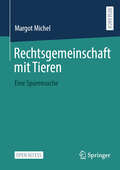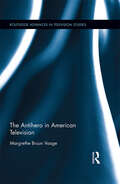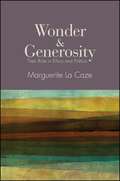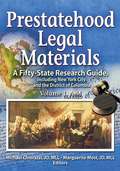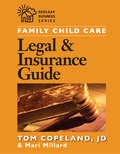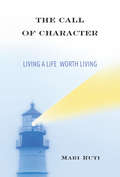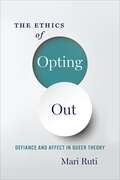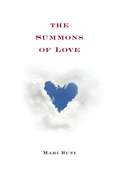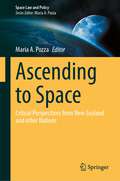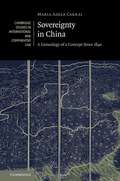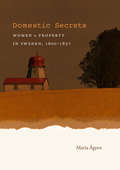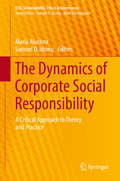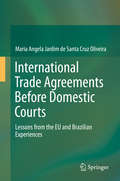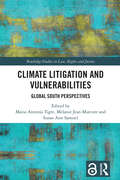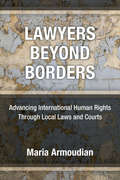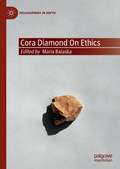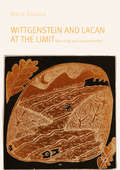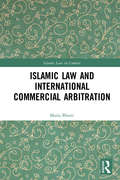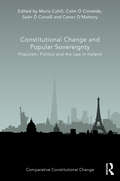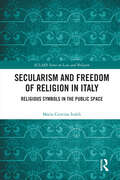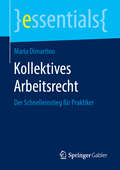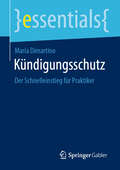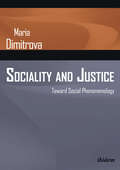- Table View
- List View
Rechtsgemeinschaft mit Tieren: Eine Spurensuche
by Margot MichelDieses Open-Access-Buch fragt, ob die alten Begründungen, mit denen Tiere traditionell aus der Rechtsgemeinschaft ausgeschlossen wurden, noch tragen und zeigt, welche Fragen sich heute stellen.Die Grenzen der Rechtsgemeinschaft sind brüchig geworden und werden gegenwärtig neu verhandelt. Welche Konzepte prägen das Recht im Hinblick auf Tiere und wie sind aktuelle Entwicklungen einzuordnen? Das Buch wandelt auf den Spuren, die Tiere hinterlassen haben auf ihrem Weg zum derzeitigen rechtlichen Status und es wagt einen Ausblick auf die Frage, wohin dieser Weg führen könnte oder sollte.
The Antihero in American Television (Routledge Advances in Television Studies)
by Margrethe Bruun VaageThe antihero prevails in recent American drama television series. Characters such as mobster kingpin Tony Soprano (The Sopranos), meth cook and gangster-in-the-making Walter White (Breaking Bad) and serial killer Dexter Morgan (Dexter) are not morally good, so how do these television series make us engage in these morally bad main characters? And what does this tell us about our moral psychological make-up, and more specifically, about the moral psychology of fiction? Vaage argues that the fictional status of these series deactivates rational, deliberate moral evaluation, making the spectator rely on moral emotions and intuitions that are relatively easy to manipulate with narrative strategies. Nevertheless, she also argues that these series regularly encourage reactivation of deliberate, moral evaluation. In so doing, these fictional series can teach us something about ourselves as moral beings—what our moral intuitions and emotions are, and how these might differ from deliberate, moral evaluation.
Wonder and Generosity: Their Role in Ethics and Politics
by Marguerite La CazeWonder and Generosity provides a fresh account of how the passions of wonder—based on accepting others' differences—and generosity—based on self-respect and mutual respect—can supplement each other to establish an ethics and politics of respect for sexual and cultural differences. Drawing on the work of both historical and contemporary thinkers, such as Descartes, Kant, Beauvoir, Arendt, Irigaray, and Derrida, Marguerite La Caze applies her theoretical framework to a range of contemporary political challenges, including asylum-seeker policies, justice for indigenous and other oppressed groups, debates over official apologies, gender equality, and responses to radical evil. La Caze's book contributes to understanding the relationship between equality and difference in public life, the extent to which we must regard others as similar in the name of equality, and the extent to which we must acknowledge significant differences.
Prestatehood Legal Materials: A Fifty-State Research Guide, Including New York City and the District of Columbia, Volumes 1 & 2 (Law Librarianship Ser.)
by Michael Chiorazzi Marguerite MostExplore the controversial legal history of the formation of the United StatesPrestatehood Legal Materials is your one-stop guide to the history and development of law in the U.S. and the change from territory to statehood. Unprecedented in its coverage of territorial government, this book identifies a wide range of available resources from each state to reveal the underlying legal principles that helped form the United States. In this unique publication, a state expert compiles each chapter using his or her own style, culminating in a diverse sourcebook that is interesting as well as informative.In Prestatehood Legal Materials, you will find bibliographies, references, and discussion on a varied list of source materials, including: state codes drafted by Congress county, state, and national archives journals and digests state and federal reports, citations, surveys, and studies books, manuscripts, papers, speeches, and theses town and city records and documents Web sites to help your search for more information and morePrestatehood Legal Materials provides you with brief overviews of state histories from colonization to acceptance into the United States. In this book, you will see how foreign countries controlled the laws of these territories and how these states eventually broke away to govern themselves. The text also covers the legal issues with Native Americans, inter-state and the Mexico and Canadian borders, and the development of the executive, legislative, and judicial branches of state government.This guide focuses on materials that are readily available to historians, political scientists, legal scholars, and researchers. Resources that assist in locating not-so-easily accessible materials are also covered. Special sections focus on the legal resources of colonial New York City and Washington, DC—which is still technically in its prestatehood stage. Due to the enormity of this project, the editor of Prestatehood Legal Materials created a Web page where updates, corrections, additions and more will be posted.
Family Child Care Legal and Insurance Guide
by Tom Copeland Mari MillardThis easy-to-read guide takes the intimidation out of running a family child care business through legal and insurance planning. From researching and purchasing homeowner's, liability, auto and disability insurance to protecting against lawsuits, the Family Child Care Legal and Insurance Guide details the many practical ways business owners can maximize their knowledge about the safeguards needed to ensure the health and prosperity of their businesses.
The Call of Character: Living a Life Worth Living
by Mari RutiShould we feel inadequate when we fail to be healthy, balanced, and well-adjusted? Is it realistic or even desirable to strive for such an existential equilibrium? Condemning our current cultural obsession with cheerfulness and "positive thinking," Mari Ruti calls for a resurrection of character that honors our more eccentric frequencies and argues that sometimes a tormented and anxiety-ridden life can also be rewarding. Ruti critiques the search for personal meaning and pragmatic attempts to normalize human beings' unruly and idiosyncratic natures. Exposing the tragic banality of a happy life commonly lived, she instead emphasizes the advantages of a lopsided life rich in passion and fortitude. She also shows what matters is not our ability to evade existential uncertainty but our courage to meet adversity in such a way that we do not become irrevocably broken. We are in danger of losing the capacity to cope with complexity, ambiguity, melancholia, disorientation, and disappointment, Ruti warns, leaving us feeling less "real" and less connected and unable to process a full range of emotions. Heeding the call of our character means acknowledging the marginalized, chaotic aspects of our being, and it is precisely these creative qualities that make us inimitable and irreplaceable.
The Ethics of Opting Out: Queer Theory's Defiant Subjects
by Mari RutiIn The Ethics of Opting Out, Mari Ruti provides an accessible yet theoretically rigorous account of the ideological divisions that have animated queer theory during the last decade, paying particular attention to the field's rejection of dominant neoliberal narratives of success, cheerfulness, and self-actualization. More specifically, she focuses on queer negativity in the work of Lee Edelman, Jack Halberstam, and Lynne Huffer, and on the rhetoric of bad feelings found in the work of Sara Ahmed, Lauren Berlant, David Eng, Heather Love, and José Muñoz. Ruti highlights the ways in which queer theory's desire to opt out of normative society rewrites ethical theory and practice in genuinely innovative ways at the same time as she resists turning antinormativity into a new norm. This wide-ranging and thoughtful book maps the parameters of contemporary queer theory in order to rethink the foundational assumptions of the field.
The Summons of Love
by Mari RutiWe are conditioned to think that love heals wounds, makes us happy, and gives our lives meaning. When the opposite occurs and love causes fracturing, disenchantment, and existential turmoil, we suffer deeply, especially if we feel that love has failed us or that we have failed to experience what others seem so effortlessly to enjoy. In this eloquently argued, psychologically informed book, Mari Ruti portrays love as a much more complex, multifaceted phenomenon than we tend to appreciate—an experience that helps us encounter the depths of human existence. Love's ruptures are as important as its triumphs, and sometimes love succeeds because it fails. At the heart of Ruti's argument is a meditation on interpersonal ethics that acknowledges the inherent opacity of human interiority and the difficulty of taking responsibility for what we cannot fully understand. Yet the fact that humans are often irrational in love does not absolve us of ethical accountability. In Ruti's view, we must work harder to map the unconscious patterns motivating our romantic behavior. As opposed to popular spiritual approaches urging us to live fully in the now, Ruti treats the past as a living component of the present. Only when we catch ourselves at those moments when the past speaks in the present can we keep ourselves from hurting the ones we love. Equally important, Ruti emphasizes transcending our individual histories of pain, an act that allows us to face the unconscious demons that dictate our relational choices. Written with substance and compassion, The Summons of Love restores the enlivening and transformative possibilities of romance.
Ascending to Space: Critical Perspectives from New Zealand and other Nations (Space Law and Policy)
by Maria A. PozzaThis book explores multidisciplinary perspectives on critical issues in space from the viewpoints of New Zealand and other nations. It brings together the topics examined at the Otago Foreign Policy School 2022 by both domestic and international experts in the area of space, and includes the opening address on space policy delivered by the Minister of Foreign Affairs. This book takes a multidisciplinary approach to New Zealand’s growing space sector in conjunction with other nations’ perspectives on space. It encompasses space science, military and defence matters, space tourism and astronaut rescue, and international legal and policy frameworks, while taking into account future considerations. Readers such as academics, students, policy advisers, diplomats, government officials and others engaged in the field of space will find value in this book. It will appeal to think tanks and international institutions grappling with the complexities that are presented by the outer space domain.
Sovereignty in China: A Genealogy of a Concept since 1840 (Cambridge Studies in International and Comparative Law #141)
by Maria Adele CarraiThis book provides a comprehensive history of the emergence and the formation of the concept of sovereignty in China from the year 1840 to the present. It contributes to broadening the history of modern China by looking at the way the notion of sovereignty was gradually articulated by key Chinese intellectuals, diplomats and political figures in the unfolding of the history of international law in China, rehabilitates Chinese agency, and shows how China challenged Western Eurocentric assumptions about the progress of international law. It puts the history of international law in a global perspective, interrogating the widely-held belief of international law as universal order and exploring the ways in which its history is closely anchored to a European experience that fails to take into account how the encounter with other non-European realities has influenced its formation.
Domestic Secrets: Women and Property in Sweden, 1600-1857
by Maria AgrenBetween the seventeenth and nineteenth centuries, women's role in the Swedish economy was renegotiated and reconceptualized. Maria Agren chronicles changes in married women's property rights, revealing the story of Swedish women's property as not just a simple narrative of the erosion of legal rights, but a more complex tale of unintended consequences. A public sphere of influence--including the wife's family and the local community--held sway over spousal property rights throughout most of the seventeenth century, Agren argues. Around 1700, a campaign to codify spousal property rights as anarcanum domesticum, or domestic secret, aimed to increase efficiency in legal decision making. New regulatory changes indeed reduced familial interference, but they also made families less likely to give land to women. The advent of the print medium ushered property issues back into the public sphere, this time on a national scale, Agren explains. Mass politicization increased sympathy for women, and public debate popularized more progressive ideas about the economic contributions of women to marriage, leading to mid-nineteenth-century legal reforms that were more favorable to women. Agren's work enhances our understanding of how societies have conceived of women's contributions to the fundamental institutions of marriage and the family, using as an example a country with far-reaching influence during and after the Enlightenment.
The Dynamics of Corporate Social Responsibility
by Samuel O. Idowu Maria AluchnaThis book explores recent developments in the theory, strategic perspective and international practice of corporate social responsibility. In particular it discusses the consequences of the economic slowdown apparent in many economies and the impact of changes in the regulatory environment. It consists of three parts: Part one addresses a variety of theoretical approaches as well as the dynamics and criticism of corporate social responsibility. It takes into account social and governmental expectations for the new and extended role of companies in the economy and in society, and provides a new context and theoretical assumptions regarding the functions and tasks of corporate social responsibility. Part two discusses the practical aspects relating to strategic management and corporate governance, corporate disclosure and reporting, as well as the empowerment of stakeholders. Lastly, part three focuses on the international practice of corporate social responsibility in various organizational and institutional settings. Using numerous case studies, the book explores the challenges and tasks of CSR in emerging markets, in the fashion industry and in global and family companies. It identifies the changes that can be detected following the financial crisis, closing the loop and linking the empirical findings with the revised theoretical framework.
International Trade Agreements Before Domestic Courts
by Maria Angela Jardim de Santa Cruz OliveiraThis book addresses the role of domestic courts in the enforcement of international trade agreements by examining the experiences of Brazilian and the European Union courts. This comparative study analyzes the differences, similarities and consequences of Brazilian and European courts' decisions in relation to the WTO agreements, which have "direct effect" in Latin American emerging economies, but not in the European Union or other developed countries. It observes that domestic courts' enforcement of international trade agreements has had several unintended and counterproductive consequences, which were foreseeable in light of international scholarly debate on the direct effect of WTO agreements. It draws lessons from these jurisdictions' experiences and argues that the traditional academic literature that fosters domestic courts' enforcement of international law should be reconsidered in Latin America in relation to international trade agreements. This book defends the view that, as a result of their function and objectives together with the principles of popular sovereignty and democratic self-government, international trade agreements should not be considered to be self-executing or to have direct effect. This empirical work will be valuable to anyone interested in the effects of international trade rules at the domestic level and the role of domestic judges in international law.
Climate Litigation and Vulnerabilities: Global South Perspectives (Routledge Studies in Law, Rights and Justice)
by Maria Antonia Tigre Melanie Jean Murcott Susan Ann SamuelThis volume explores climate litigation as a means to tackle the rights and socio-ecological, intergenerational, gender, racial, and other justice implications of the ever-growing vulnerability to climate change, whilst critically engaging with the notions of vulnerability and intersectional climate justice.With insightful analysis, thought-provoking case studies, and a global perspective, the collection illustrates the opportunities and pitfalls of litigation pursued by people from the Global South who face intersecting forms of oppression and marginalisation amidst the climate crisis. Contributors discuss litigation strategy, novel legal arguments, institutional barriers, and unique socio-ecological and political challenges in the Global South. Divided into two parts, the book recognises that climate change is an existential threat to humanity more frequently being tackled in courts worldwide. The first part exposes the limits of litigation as a mechanism for intersectional climate justice for vulnerable people in the Global South. The second part highlights innovations in climate litigation in pursuit of intersectional climate justice.The book will be of interest to academics, researchers, and policymakers in the areas of human rights law, environmental law, climate law, Latin American studies, South Asian studies, and African studies.
Law, Psychoanalysis, Society: Taking the Unconscious Seriously
by Maria Aristodemou'I swear to tell the truth, the whole truth, and nothing but the truth' we say in a court of law. 'In a court of law, the truth is precisely what we will not say', says Lacan. ‘If God is dead, everything is permitted’, writes Dostoyevsky. ‘If God is dead, everything is prohibited’, responds Lacan. ‘I think, therefore I am’, reasons Descartes. ‘I am where I do not think’, concludes Lacan. What are we to make of Lacan’s inversions of these mottos? And what are the implications for the legal system if we take them seriously? This book puts the legal subject on the couch and explores the incestuous relationship between law and desire, enjoyment and transgression, freedom and subjection, ethics and atheism. The process of analysis problematizes fundamental tenets of the legal system, leading the patient to rethink long-held beliefs: terms like ‘guilt’ and ‘innocence’, ‘truth’ and ‘lies’, ‘reason’ and ‘reality’, ‘freedom’ and ‘responsibility’, ‘cause’ and ‘punishment’, acquire new and surprising meanings. By the end of these sessions, the patient is left wondering, along with Freud her analyst, whether ‘it is not psychology that deserves the mockery but the procedure of judicial enquiry’. A unique study on the nexus of Law and Psychoanalysis, this book will interest students and scholars of both subjects, as well as general readers looking to explore this perverse and fascinating relationship.
Lawyers Beyond Borders: Advancing International Human Rights Through Local Laws and Courts
by Maria ArmoudianDespite international conventions and human rights declarations, millions of people have suffered and continue to suffer torture, slavery, or violent deaths, with no remedy or recourse. They have fallen, in essence, “below the law,” outside of law’s protection. Often violated by their own governments, sometimes with support from transnational corporations, or nations benefiting from human rights violations, how can these victims find justice? Lawyers Beyond Borders reveals the inner workings of the advances and retreats in the quest for redress and restoration of human rights for those whom international legal-political systems have failed. The process of justice begins in the US, with a handful of human rights lawyers steeped in the American tradition of advancing civil rights through civil litigation. As the civil rights movement gained traction and an ample supply of lawyers, this small cadre turned their attention toward advancing international human rights, via the US legal system. They sought to build another piece of the rights revolution, this time for survivors of egregious human rights violations in faraway lands. These cases were among the most unlikely to be slated for victory: The abuses occurred abroad; the victims are aliens, usually with few, if any, resources; the perpetrators are politically powerful, resourced, and well connected, often members of governments, militaries, or multinational corporations. The legal and political systems’ structures are mostly stacked against these survivors, many who bear the scars of trauma and terror. Lawyers Beyond Borders is about agency. It is about how, in the face of powerful interests and seemingly insurmountable obstacles—political, psychological, economic, geographical, and physical—a small group of lawyers and survivors navigated a terrain of daunting barriers to begin building, case-by-case, new pathways to justice for those who otherwise would have none.
Cora Diamond on Ethics (Philosophers in Depth)
by Maria BalaskaThis collection offers an in-depth look at Cora Diamond’s distinctive approach to ethics and its philosophical significance. It comprises a new essay by Cora Diamond on the policing of concepts, followed by ten original chapters by world-class scholars covering conceptual loss, moral theory, the category of the human, the moral consideration of animals, and the meaning of narcissism. Including comparisons to the work of other contemporary moral philosophers such as Martha Nussbaum, Jeff McMahan, Rai Gaita, Eva Kittay, Christine Korsgaard, and Edward Harcourt, the volume also creates interdisciplinary links between Diamond’s work and other fields of study, including psychoanalysis and contemporary ethology. Showcasing the vital importance of Diamond’s contribution to philosophy, this volume is essential reading for scholars working in ethics, philosophy of language and literature.
Wittgenstein and Lacan at the Limit: Meaning and Astonishment
by Maria BalaskaThis book brings together the work of Ludwig Wittgenstein and Jacques Lacan around their treatments of ‘astonishment,’ an experience of being struck by something that appears to be extraordinarily significant. Both thinkers have a central interest in the dissatisfaction with meaning that these experiences generate when we attempt to articulate them, to bring language to bear on them. Maria Balaska argues that this frustration and difficulty with meaning reveals a more fundamental characteristic of our sense-making capacities –namely, their groundlessness. Instead of disappointment with language’s sense-making capacities, Balaska argues that Wittgenstein and Lacan can help us find in this revelation of meaning’s groundlessness an opportunity to acknowledge our own involvement in meaning, to creatively participate in it and thereby to enrich our forms of life with language.
Islamic Law and International Commercial Arbitration (Islamic Law in Context)
by Maria BhattiThis book examines the intersection between contemporary International Commercial Arbitration and Shariʿa law in order to determine possible tensions that may arise between the two systems. It develops evidentiary and procedural rules under Shariʿa, as well as examining the consequences of stipulating qualifications of arbitrators based on gender and/or religion. The author extensively analyses the prohibition against interest (riba) and uncertainty (gharar) under Shariʿa and its impact on arbitration agreements, arbitral awards and public policy. The book also explores the prohibition against riba in light of international conventions, such as the United Nations Convention on Contracts for the International Sale of Goods. Case studies in the book include the Asian International Arbitration Centre, formerly the Kuala Lumpur Regional Centre for Arbitration, and the International Islamic Centre for Reconciliation and Arbitration, as well as the ‘Shari’a Standards’ developed by the Accounting and Auditing Organization for Islamic Financial Institutions. The book will be a valuable resource for academics, students and practitioners working in the areas of Islamic law and the Islamic finance industry.
Constitutional Change and Popular Sovereignty: Populism, Politics and the Law in Ireland (Comparative Constitutional Change)
by Maria Cahill, Colm Ó Cinnéide, Seán Ó Conaill and Conor O’MahonyThis collection focuses on the particular nexus of popular sovereignty and constitutional change, and the implications of the recent surge in populism for systems where constitutional change is directly decided upon by the people via referendum. It examines different conceptions of sovereignty as expressed in constitutional theory and case law, including an in-depth exploration of the manner in which the concept of popular sovereignty finds expression both in constitutional provisions on referendums and in court decisions concerning referendum processes. While comparative references are made to a number of jurisdictions, the primary focus of the collection is on the experience in Ireland, which has had a lengthy experience of referendums on constitutional change and of legal, political and cultural practices that have emerged in association with these referendums. At a time when populist pressures on constitutional change are to the fore in many countries, this detailed examination of where the Irish experience sits in a comparative context has an important contribution to make to debates in law and political science.
Secularism and Freedom of Religion in Italy: Religious Symbols in the Public Space (ICLARS Series on Law and Religion)
by Maria Cristina IvaldiThe display of religious symbols in the public space has been the subject of much debate. This book provides an overview of the presence of religious symbols in Italian public institutions from a legal standpoint.The situation is analysed from the perspective of the principles of laicità/secularism, as defined by the Constitutional Court, and freedom of religion. It is argued that while the display of religious symbols in public institutions has been widely investigated doctrinally, the wearing of religious symbols in Italy has generally been neglected. Key cases are examined in light of national jurisprudence as well as intervention by the European Court of Human Rights and relevant judgments from foreign courts regarding this issue. Finally, the work considers the presence of religious symbols that transcend national borders, as in the case of arts, sport and advertising. A comparison is made with the French system which takes a very different approach. The book outlines possible ways forward in light of the growing interculturality of European societies.It will be a valuable resource for academics, researchers and policy-makers working in the areas of law and religion, and comparative law.
Kollektives Arbeitsrecht: Der Schnelleinstieg für Praktiker (essentials)
by Maria DimartinoIm Zentrum des essentials steht die Kurzdarstellung des praxisrelevanten kollektiven Arbeitsrechtes. Maria Dimartino bietet eine Zusammenstellung der wichtigsten Begriffe, eine Übersicht des Betriebsverfassungsrechtes, der Beteiligungsrechte von Arbeitnehmergremien, der Grundlagen des Tarifrechts, des Streikrechts sowie der Arbeitsgerichtsverfahren. Die Autorin sensibilisiert zudem für die Themen Beschäftigtendatenschutz und Arbeitnehmergremien im Unternehmen. Das essential ist speziell auf die Bedürfnisse von Praktikern zugeschnitten. Zudem finden Sie wichtige Hinweise, Praxistipps und Übersichten.
Kollektives Arbeitsrecht: Der Schnelleinstieg für Praktiker (essentials)
by Maria DimartinoIm Zentrum dieses essentials steht die Kurzdarstellung des praxisrelevanten kollektiven Arbeitsrechts. Maria Dimartino erklärt prägnant die wichtigsten Begriffe und bietet eine Übersicht des Betriebsverfassungsrechts, der Beteiligungsrechte von Arbeitnehmergremien, des betrieblichen Eingliederungsmanagements, der Grundlagen des Tarifrechts, des Streikrechts, der Arbeitsgerichtsverfahren sowie weiterer Arbeitnehmergremien im Unternehmen. Das essential ist speziell auf die Bedürfnisse von Praktikern zugeschnitten. Neu in der 2. Auflage sind die Themen Einsatz von KI und betriebliches Eingliederungsmanagement.
Kündigungsschutz: Der Schnelleinstieg für Praktiker (essentials)
by Maria DimartinoDieses essential richtet sich an alle Praktiker des Arbeitsrechts und ist speziell auf ihre Bedürfnisse zugeschnitten. Es behandelt die wichtigsten Anwendungsfelder und erläutert die Formalien, Kündigungsarten und den Mindestkündigungsschutz, der unabhängig von der Betriebsgröße und ohne besonderen Kündigungsschutz oder Kündigungsgrund greift. Praxisrelevante Fallgruppen des besonderen Kündigungsschutzes sowie Kündigungsverbote werden vorgestellt – der besondere Kündigungsschutz beispielsweise schützt nur unter bestimmten Voraussetzungen. Neben den Beteiligungsrechten von Betriebsrat und Schwerbehindertenvertretung werden auch der Ablauf des Kündigungsschutzverfahrens und die Abgrenzung zum Aufhebungsvertrag dargestellt. Mit praktischen Checklisten und Übersichten.
Sociality and Justice: Toward Social Phenomenology
by Maria DimitrovaBuilding on the work of Emmanuel Levinas, this groundbreaking book puts the phenomenological paradigm into a new perspective. Overcoming the focus on self-reflection of the thinking subject and instead arguing for the importance of sociality as responsibility for the Other, this new approach is based on inter-subjectivity and introduces a social dimension in phenomenology. This also allows for a different interpretation of the notion of justice, which in this context sits in the space between the one, the other, and the third before settling into any relation to the law. In the vast area inhabited by more or less distant others, moral responsibility is implemented through the establishment and maintenance of just institutions.
